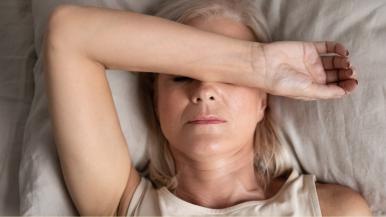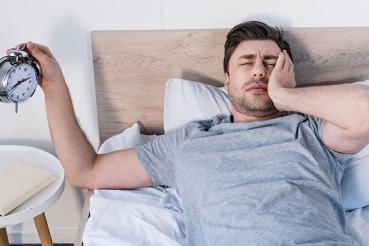A good night’s sleep can be hard to come by when you wake up in a pool of sweat. But getting to the bottom of what’s causing night sweats is often difficult, says Kathleen Rowland, MD, MS, a family medicine specialist at Rush.
Night sweats affect two out of five middle-aged adults — although some studies have found an even higher prevalence, Rowland says.
Night sweats: Rarely cause for concern
Most of the time, night sweats are harmless, she says. But occasionally, they can be a sign that you’ve caught the flu, COVID-19 or another bug. “Almost any kind of infection can cause night sweats,” she says. This includes kidney infections and much rarer infections like tuberculosis.
In other cases, the cause may be thyroid or liver disease, or a sleep disorder like obstructive sleep apnea. Night sweats can also be a symptom of a serious health issue like lymphoma, a type of cancer that affects lymph nodes, bone marrow and other parts of the lymphatic system.
“While night sweats are a common symptom for people with lymphoma, very few people who have night sweats have cancer,” Rowland explains.
Medications that can make you sweat
Night sweats are a frequent side effect of many medications, Rowland says. This includes the following:
- Steroids
- Birth control pills and other hormone therapies
- Insulin and other diabetes medications
- Antidepressants
- Blood pressure medicines
Even if you suspect your medicine may be causing night sweats, be sure to check with your doctor before you stop taking a medication, Rowland advises.
Night sweats during menopause: More treatable than other types
Among middle-aged women, one of the chief causes of night sweats is menopause. Some women may suffer from night sweats for six to 10 years or more during the menopausal transition, Rowland says.
But there is some good news. “Hot flashes” and night sweats — what doctors call the vasomotor symptoms of menopause — are often more treatable than other types of night sweats, she says.
One lifestyle change that can help reduce menopausal sweating is being more active, which seems counterintuitive because exercise can make you sweat. “Those who stay active throughout perimenopause and menopause have a bit of improvement in their vasomotor symptoms,” Rowland says. Avoiding alcohol can also help tame hot flashes and night sweats.
When these changes aren’t enough, medicines that can ease menopausal night sweats include venlafaxine or escitalopram, two types of antidepressants.
If menopausal night sweats don’t respond to an antidepressant, another option is hormone replacement therapy. However, HRT isn’t ideal because it can raise the risk for stroke and heart attack and may only provide temporary relief.
“When you stop HRT, a lot of times those hot flashes and night sweats come back because you’re taking away the hormone that was staving off the sweating,” Rowland says.
Changes to help you keep your cool at night
You may be able to get relief by altering your nighttime routine. Rowland suggests the following strategies to reduce night sweats:
- Turn down the thermostat. The National Sleep Foundation says the ideal bedroom temperature is 60 to 67 degrees. “The temperature for staying asleep is often a lot cooler than the best temperature for falling asleep,” she says.
- Consider using a fan in the bedroom.
- Choose light, breathable pajamas.
- Use layered covers on your bed, so you can remove a blanket or two if you heat up.
When to talk to your doctor
“If you’ve had night sweats for a long time, they aren’t changing much and you are still able to wake up in the morning feeling refreshed, it’s OK not to feel worried,” Rowland says. “But if night sweats are new for you, getting worse or disrupting your sense of restfulness, you may want to talk to a doctor.”
If you see a doctor, it’s helpful to provide answers to the following questions:
- How long have you had night sweats?
- How much do you sweat (for example, do you soak through the sheets)?
- Do your night sweats wake you up?
- Do you have any other symptoms (such as a cough, fever, breathing problems, enlarged lymph nodes or weight loss) that started around the same time as your night sweats?
- Are you experiencing a lot of stress?
Your doctor may recommend bloodwork or other tests. But if you are like many people with night sweats, your results may not point to a culprit.
“Most of the time, night sweats don’t have a clear explanation, which can be frustrating for patients and for their doctors,” Rowland says. However, seeing a doctor can put your mind at ease by ruling out other conditions that might cause night sweats. “That’s what we’re here for,” she adds.
If you are concerned about night sweats, a Rush primary care provider is ready to help.




